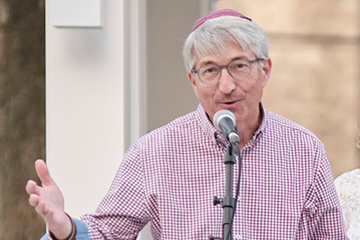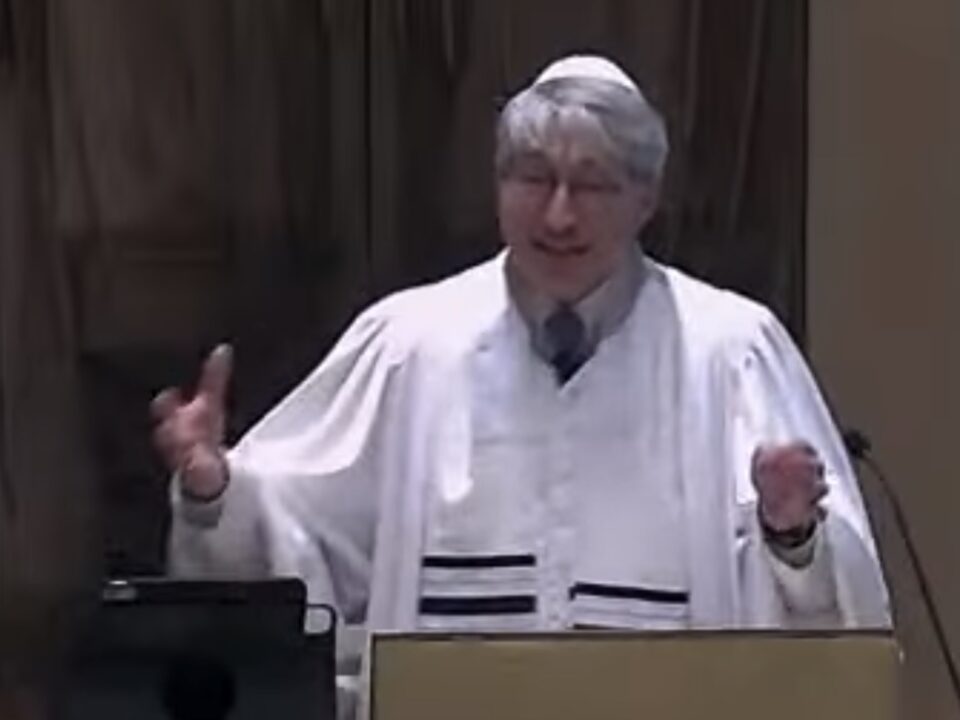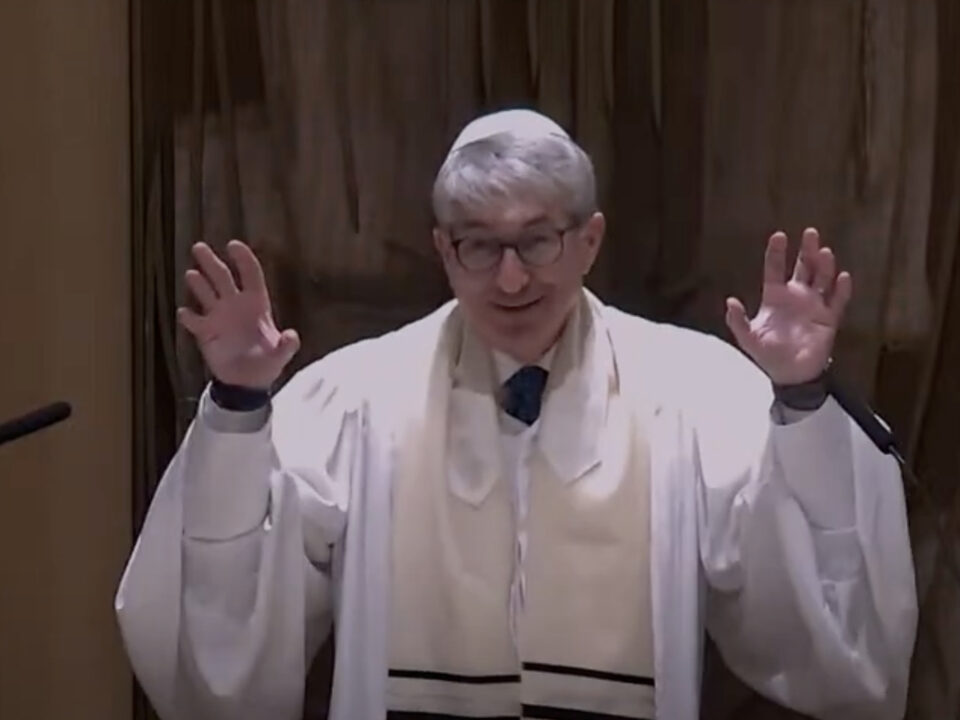
Opening Iyyun (teaching) Yom Kippur Family Service
September 16, 2021
Rabbi Frankel’s Sermon for Rosh Hashanah, 5783/2022
September 29, 2022Grief-Life Gardeners: Replanting Hope...Reconceiving Our World
Curiously, the Sunday NY Times Real Estate headline mid-July reflected just how I was feeling inside, and how many of us may be feeling still.
"The Only Certainty Right Now is Uncertainty."
My association, of course, had nothing to do with rising mortgage rates, nor with faltering sales, but the rather sorry state of our world. Thinking more about it, the ‘front-page’ of our lives may be even more dire than the headline described. Tumultuous, trepidatious, some days terrifying, feeling the meshugas [the madness] that reflects our collective loss, it often seems like we are living in a state of prolonged grief... Every week another tragedy...that keeps the flags flying at half-staff and our hearts feeling broken. With a gun-epidemic that takes another American life every 14 minutes and a contagion that’s killed more than 6 million globally notwithstanding, we are mourning even more: The loss of the life we thought we knew...A world, perhaps in our naivete, that felt relatively stable...pretty much safe, not about to go “off the rails” at any minute. But confronted by life’s daily insanity, the inexplicable inhumanity, the callousness and cruelty, it’s hard not to feel forlorn...burdened by so much that’s broken, aggrieved by so much that’s gone.
Now I’m not bemoaning some nostalgic, idealized past, A Norman Rockwell painting of reality...Rather the world many of us imagined, or hoped we lived in...A world where morality mattered, and the most unethical, immoral people did not prosper as a result of their depravity.
...A world where truth trumped falsehood...
...A world where politics were not always polarizing,
...A world where difference did not lead to demonization, or the unthinkable possibility of pulling out a gun, more likely an assault rifle, to shoot that difference dead.
...A world where the personal pursuit of liberty was not a limited-liability...
where Church did not insidiously seep into State,
...Where life was a woman’s personal right to choose.
...A world where the underlying belief that people, even if divergent in their viewpoints, when left to their own devices, could see their way clear to a greater good, or at least find some common ground on which all of us could stand.
Psychotherapist, author, and editor at Harper’s Gary Greenberg captures the depth of our distress:
"I am heartsick over the loss of a shared world so total that we can’t even agree on what has been lost, let alone mourn it in unison or, for that matter, pick up the pieces and see if we can fashion something better out of them."
[NYT, 5.8.22]
Rosh Hashanah, rabbinically speaking, is known as YOM HaRAT OLAM, not the day the world begins nor even the day the world is born, but rather “the day the world is reconceived,” year after year after year.... The Rabbis were trying to tell us something about the perennially worrisome state of our world, and so too, New Year’s unchanging challenge: To confront the craziness, the inevitable feeling of loss,
To see beyond this grief-stricken world and find a way forward, a path to reconceive our place, and thereby, renew our life-purpose. Facing so much daily disappointment, frustration on all sides, it would be much easier to throw up our hands or throw in the towel.
When Hades, the god of death kidnaps Persephone, goddess of springtime, the world above dries up. WHY? Because Persephone’s mother, Demeter, is so grief-stricken that she abandons her duties as Global Gardener altogether, keeping alive the world’s growth. Only when Persephone returns from the underworld does the earth begin to bloom again.
HOW might it be possible for us to tend the landscape of our lives, uncultivated as it often appears, so as to give way to new growth? Counter-intuitively, I believe, by turning to the guidance of Jewish grief...the ways we deal with personal loss can teach us profound lessons. For not alone making it through this ofttimes mournful, worrisome world, but helping us to replant hope...
BUT...before we consider three guidelines drawn from our journey of facing loss that help us harvest seeds of renewed purpose, we preface it with a principle of stories that reminds us: It all rests on how we remember! Prof Dara Horn, [our LT Fall SIR, Oct 28-29] writing in her bold new book of last year: People Love Dead Jews, understands why the way we recall our past can renew our hope in tomorrow.
"What one finds in Jewish stories is a kind of realism that comes from humility, for one cannot be true to the human experience while pretending to make sense of the world. Our stories may be lacking conclusions, but they are filled with endurance and resilience...Jewish stories are never endings, but always new beginnings, the beginning of our search for meaning in...a world that seldom makes sense."
[pg. 79, adapted]
Grief-Life-Gardening Guideline 1:
Loss reads backwards: from the devastation of death to seeds of new life. When Susan was diagnosed with cancer at 51, over 10 years ago, after 9 months of treatment and a year of remission, she spent lots of her time reimagining and planning, digging, and planting, backyard flower beds and rows of bushes, Hydrangea, Forsythia...In one prototypical picture on our fridge to this day she’s in her white blouse, jeans rolled up with her red headband on, hose in hand, watering out back yet looking into the distance with a knowing smile. Spending what turned out to be the last 18 months of her life buying stuff we didn’t need, candles of all kinds and a plentiful supply of patty goods, a new set of everyday dishes with service for 18, stocking the kitchen with gadgets she’d never use, purchasing lovely B-day gifts she’d never give... It was only after she left us at just 55 that I saw her scheme in retrospect.
Though her ending certainly made no sense, by taking care of what she could, her resilience remained...for Susan, my Dolly, was a life-gardener, planting in the people she most loved tiny bulbs of her spirit that would blossom. Even through the ground of our grief...
-Her unrelenting in your face compassion,
-Her chutzpah-driven stand up for the underdog resolve,
-Her nourishing care that filled your stomach & your heart,
-Her X-Ray vision that saw gifts inside you didn’t know were there.
Overwhelmed with loss, Susan’s dearest friends, her family, especially her kids learned what grief consultant Megan Devine masterfully teaches: We don’t bury loss. We carry it with us. Loss gets integrated, not overcome. We sew its seeds over time so they eventually begin to blossom in the landscape of our lives. Unforeseen, petals of promise appear. In a world that seldom makes sense, can we cull from the craziness seeds of hope.
Grief Life-Gardening Guideline 2:
Leaving us bereft of life answers, Loss compels us to live in the question. For almost the last quarter century, Krista Tippet has explored the unanswerable. Through her weekly American Public Media show, “On Being” [formerly Speaking of Faith,] Last month marked the show’s new start as a seasonal podcast, still guided by Tippet’s deep spiritual quest for shared discovery through questioning conversation w/some of the great thinkers of our day. Commenting on her operative aspiration as a journalist mid-summer, Tippet spoke to the challenge we face this moment.
"I’m contrasting generative possibilities with the dysfunctional landscape of our time...The places of power are broken...But in every community and field of endeavor there are people working generatively to create new possibilities... refusing to accept that the world has to be this way. I talk about hope being a
muscle ...I see the brokenness, the damage, and the pain...but I also see people stitching together relationships, engaging in conversation at a human level"
The interviewer then asks: "Why are you so drawn to conversation as the key?" Tippet’s reply is our RH replanting challenge...
“I feel a sense of calling. I’m attending to the pain of our world... But this calling comes with a question: Can we attend to the power of love and joy as well?...Your calling may be something you do that gives you joy but that you are never going to get paid for. It can be how you show up, how you treat strangers...the things that amplify your best humanity...What you are called to do in this world so in love with the answers is to hold onto the question, to dwell respectfully with the question...to engage in the conversation humanely...Doing that, you’ll live your way into the answer.”
[NYT Magazine 7.10.22]
Tippet is teaching the same humility of heart we are compelled to bring to a shivah visit, not negating the intensity of loss with those well-meaning reductionist responses:
“It’s probably for the best...You had him for so long... I know just what you’re going thru...She’s in a better place”
Showing up for Shivah affirms the power of simply being there for each other, even without an answer, to talk, or just listen...to hear the heart speaking without ever saying a word...In a world pulled apart by people who have all the answers, can we discover thru humane, humble-hearted dialogue how to live in the question?
Grief Life-Gardening Guideline 3:
Loss is singular, but nobody makes it through on their own. Because each life is inimitably distinct, no two losses are exactly alike. Thus, the brokenness we bear is ours alone. Yet, since we all suffer loss at some deep human level, through the pain we’ve felt, the sadness we’ve seen, we are linked.
And the irony of grief’s journey is just this: though we cannot magically make ourselves whole, we can help each other put our world back together again. In the heat of summer comes a Jewish Holy Day few of us mark, or are even aware is there. Commemorating the loss of the 1st & 2nd Holy Temples and the accompanying destruction of Jerusalem, Tisha B’Av, the minor fast day has, in Reform circles, been largely forgotten. Yet it could hold a key to our sewing seeds of new life in the face of loss...I remember as a 16-year-old being moved by a sense of communal mourning sitting on a candle-lit field at Camp Tel-Yehudah, verses from the Book of Lamentations crying out:
“How sad the city sits, with none to comfort her... All her inhabitants sigh, she weeps with bitterness through the night.”
Looking up at the starlit sky, we weren’t mourning the destruction of a sacred structure, but an historic devastation of the Jewish spirit...Rather than calling for the rebuilding of the Third Temple the reinstatement of priests and animal sacrifice, we were hoping that by holding each other up, we could spark a Jewish renewal bigger than any building, greater than us all.
Rabbi Sandra Cohen frames our RH life gardening aim:
“The Second Temple was destroyed because of Sinat Hinam—Baseless Hatred. So many today suffer because of other people’s ignorance. We do not open our arms to those who are different...We act with judgment, not kindness. On Tisha B’Av might we build a symbolic Third Temple—not of brick & stone, but one of inclusivity and compassion...What this ancient fast is teaching us to build today is an era of Ahavat Hinam—Unsolicited, Unconditional Love.”
Commenting on the prophetic witness of James Baldwin’s 1964 essay “Nothing Personal,” a deep probe into the turmoil of that American moment, Princeton Prof Eddie Glaude speaks to this tumultuous moment:
“In the end, the power of love, of loving someone and being loved, equips us to endure the world as it is and imagine the world as it could be...We all have saints that bear witness, the love of others who brought us through the storm... who, through the horror, still loved us, and so still refuse to die.”
[Nothing Personal, pg. 68]
In readying for Rosh Hashanah, we’re encouraged to visit the graves of loved ones...WHY? Though the Sages suggested it was part of our personal repentance, seeking forgiveness for our wrongs from the souls of our dearly departed, I think I know the real reason: it’s to bear our hearts, to share our brokenness, so they can help us replant hope. We get to their grave, and have a little talk, a quiet conversation. We schmooze over life together, so they can remind us, crazy as this world often feels, all is not lost. When I last went up to sit by my wife’s stone in our hometown of Haverhill, Mass., to spend a little time there with my Dolly, she shared a few life-gardening tips...and not softly. Quiet was never her communication mode. This was her advice to me, maybe today, to us all:
First-off, plant seeds wherever you go...even where the ground looks lousy. Even where hearts/minds seemed closed, you just never know where new life/seeds will grow.
Second, as was the case in our backyard, thanks to her dedicated hand, imagining a new landscape alone is not enough. You have to water and weed regularly for anything to really happen. You want to transform this world? Get down on the ground. Plant compassion. Have uncomfortable conversations. Water generously with kindness. Listen, even when it’s hard to hear. Allow the sun to shine where light is needed most... And lastly, when life feels overwhelming...If the inhumanity, insanity & injustice is just too much to take, when the world’s woe/grief gets to you, realize...with a love that flowers through the legacy you bring to life, you are never sowing alone!
This New Year, may we become global life gardeners tending our tiny plot in the landscape of our lives so that even when loss looms large, even without most of the answers, planting seeds of hope—answering the call with our best humanity, we will grow a world replenished by the harvest of our hearts, renewed by the promise of our love....AMEN.






